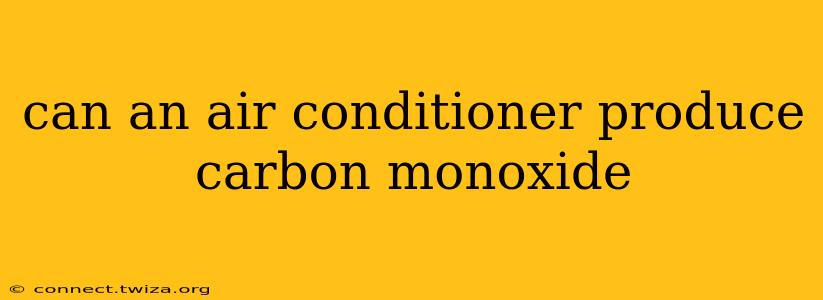Can an Air Conditioner Produce Carbon Monoxide?
The short answer is: rarely, but yes, under specific circumstances. While air conditioners aren't primarily designed to burn fuel and therefore don't typically produce carbon monoxide (CO), several situations can lead to its presence. Understanding these scenarios is crucial for ensuring your safety.
What Causes Carbon Monoxide in Air Conditioners?
Most modern air conditioners are electrically powered and don't directly burn fuel, minimizing the risk of CO production. However, problems can arise:
-
Faulty or Blocked Exhaust in Gas-Powered Units: Older or less common air conditioning units, especially those integrated with a gas furnace or heating system, use a gas-powered component. A malfunctioning or blocked exhaust system in these units can cause a buildup of CO. This is a significant danger and requires immediate professional attention. The exhaust needs to vent properly to the outside.
-
Improper Installation: Incorrect installation of any gas-powered element within an air conditioning system can lead to CO leaks. Always ensure a qualified HVAC technician handles the installation of any gas-powered appliance.
-
Malfunctioning Internal Combustion Engine (Rare): Some very old or specialized air conditioning units might use internal combustion engines. A malfunctioning engine in such a unit could produce CO. This is exceedingly rare in modern residential or commercial settings.
-
Combustion of Other Materials: Although extremely rare, a short circuit or other electrical malfunction could potentially ignite nearby combustible materials, leading to CO production. This is an indirect cause and not a typical outcome of air conditioner operation.
How Can I Tell if My Air Conditioner is Producing Carbon Monoxide?
Detecting CO from an air conditioner requires vigilance. The symptoms aren't always immediately linked to the AC unit. Be aware of these signs:
-
CO Poisoning Symptoms: Headaches, dizziness, nausea, weakness, and shortness of breath are key symptoms of CO poisoning. If you experience these symptoms, especially while the AC is running, get fresh air immediately and contact emergency services.
-
Unusual Odors: A burning smell, though not always indicative of CO, warrants investigation. A persistent unusual odor from your AC unit should be checked by a professional.
-
Visible Soot or Deposits: If you notice soot or unusual deposits near your air conditioner's exhaust (if it has one), it suggests potential combustion problems.
What Should I Do If I Suspect My Air Conditioner is Producing Carbon Monoxide?
Do not attempt to diagnose or repair the problem yourself. Carbon monoxide is an invisible, odorless, and deadly gas. Your immediate actions should be:
- Turn off the air conditioner.
- Ventilate the area. Open windows and doors to allow fresh air to circulate.
- Leave the area immediately. Get fresh air and seek medical attention if you experience any symptoms of CO poisoning.
- Contact a qualified HVAC technician. They can properly inspect your unit and identify the source of the problem. Never use your air conditioner again until it's been thoroughly checked and repaired by a professional.
How Often Should I Have My Air Conditioner Serviced?
Regular maintenance significantly reduces the risk of malfunctions. Schedule annual inspections and servicing by a licensed HVAC technician. This ensures your system functions efficiently and safely, minimizing the chances of unexpected CO production.
Is it possible for a window air conditioner to produce carbon monoxide?
Yes, while less common than with larger, potentially gas-powered units, a window air conditioner can theoretically produce carbon monoxide under the same circumstances described above – primarily due to a malfunction or improper installation (though this is extremely rare). Any unusual smells or symptoms should prompt immediate investigation.
This information is for general knowledge and safety purposes only and should not be considered a substitute for professional advice. Always consult with a qualified HVAC technician for any concerns about your air conditioning system or carbon monoxide safety.
